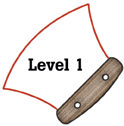
Alaska Science
Key Element B5
A student who meets the content standard should employ ethical standards, including unbiased data collection and factual reporting of results.
 |
Alaska Science A student who meets the content standard should employ ethical standards, including unbiased data collection and factual reporting of results. |
|
Performance Standard Level 1, Ages 5–7
|
|
|
|
Sample Assessment Ideas
|
|
|
Expanded Sample Assessment Idea
|
|
Procedure Students will:
Reflection and Revision
|
Levels of Performance |
||
|
Stage 4 |
Student work is complete, correct and shows evidence of elaboration and extension. Students report detailed observations and inferences and differentiation between the two. | ||
|
Stage 3
|
Student work is generally complete, correct and may show evidence of elaboration and extension. Students report observations and inferences and differentiation between the two though minor errors may be present. | ||
|
Stage 2
|
Student work may be incomplete or incorrect and shows limited evidence of ability to report observations, make inferences or differentiation between the two. | ||
|
Stage 1
|
Student work is mostly incomplete and incorrect. Student makes limited observations or is unable to use observations to identify the object in the black box. | ||
Standards Cross-References
|
||
|
National Science Education Standards Scientists make the results of their investigations public; they describe the investigations in ways that enable others to repeat the investigations. (Page 123) Scientists review and ask questions about the results of other scientists’ work. (Page 123) |
Benchmarks A lot can be learned about plants and animals by observing them closely, but care must be taken to know the needs of living things and how to provide for them in the classroom. (Page 15) |
|
Table of Contents | Return to Alaska Native Knowledge Network